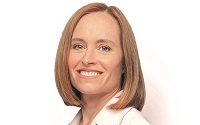Dr. Jeannie Callum is a new member of SEAMO, cross-appointed to the Departments of Pathology and Molecular Medicine and Medicine. She comes to Kingston from Toronto, where she completed her medical school and residency training. “I did my fellowship in hematology and internal medicine and transfusion all at the University of Toronto, University Health Network. Then I got a staff job at Sunnybrook Health Sciences Centre as the Director of Transfusion Medicine and I’ve been there for the last 20 years,” she says. During her time at Sunnybrook, Dr. Callum was a combination of a clinical hematologist, running clinics, doing consults for hematology as well as running the transfusion service for Sunnybrook and completing research. “The research was really to do with how to manage bleeding patients that are bleeding after cardiac trauma or surgery and then research into utilization of products, trying to improve utilization of blood products, and reducing errors to do with transfusion medicine,” she says. “I’ve published a lot of papers on the mistakes we make during the transfusion process, tracking those errors, and testing strategies to eliminate them.”
Molecular Medicine and Medicine. She comes to Kingston from Toronto, where she completed her medical school and residency training. “I did my fellowship in hematology and internal medicine and transfusion all at the University of Toronto, University Health Network. Then I got a staff job at Sunnybrook Health Sciences Centre as the Director of Transfusion Medicine and I’ve been there for the last 20 years,” she says. During her time at Sunnybrook, Dr. Callum was a combination of a clinical hematologist, running clinics, doing consults for hematology as well as running the transfusion service for Sunnybrook and completing research. “The research was really to do with how to manage bleeding patients that are bleeding after cardiac trauma or surgery and then research into utilization of products, trying to improve utilization of blood products, and reducing errors to do with transfusion medicine,” she says. “I’ve published a lot of papers on the mistakes we make during the transfusion process, tracking those errors, and testing strategies to eliminate them.”
Dr. Callum says an opportunity arose from Kingston to focus more on just transfusion medicine and research and step away from the clinical hematology portion of her job. Exciting news came in July as her team received $1.05 million in funding from CIHR for a new clinical trial assessing novel transfusion strategies for trauma patients. Dr. Callum says, “We’re excited about this new trial we’re doing with trauma patients in ten sites across the country to basically manage the bleeding in the trauma bay for that first two to three hours into the resuscitation with a novel strategy to see if we can provide better, safer, faster care to trauma patients. The big plan for the next three years is to complete this trauma trial and another bleeding trial in bleeding cardiac surgery patients.”
Bringing cutting edge transfusion services to the region is something Dr. Callum is really looking forward to in her new role. “Because the entire region is going to a single information technology platform this will allow us to create an epicentre of innovation in transfusion medicine and putting us on the map for excellence in research and clinical care, and that’s where we’re going,” she says. “There’s so much good to be done in the Kingston area to optimize the transfusion service. The community is friendly, conscientious and cooperative, doing this in this region is going to be easier than doing this in a much more complicated and difficult environment.”
Dr. Callum says she is grateful to be situated as a physician in both the Departments of Pathology and Molecular Medicine and Medicine. “The Department of Pathology and Molecular Medicine is really an exceptional group here and there is really fantastic leadership on the research and operational side. There’s a collaborative feeling here. On the Medicine side, the hematology team here have been super welcoming. The technologists within the blood bank are amazing, enthusiastic, hard-working and are embracing change,” she says.
She has a five-year plan for where she would like to go during her time in Kingston to bring the region to a centre of excellence for transfusion medicine. “Over the first year, the most important things for me to see brought to KHSC are automation for the blood bank, eliminating paper-driven processes, bringing electronic crossmatch to Kingston, and bringing the transfusion practice to a cutting-edge level,” she says. “We have learned from multiple randomized control trials learned that we give way too much blood to patients so bringing that evidence from the clinical trials to the bedside is key. We’re well under way with this with great support from the clinicians and programs such as “choosing Wisely Canada”.”
Finally, Dr. Callum says she is pleased to be practicing medicine in a place like Kingston. “The Kingston region is small enough and big enough so you have a great combination; it’s not too big that you have this clunky, rigid process to achieve change, but at the same time we have all the services. They’re managing trauma patients, performing organ transplants, running a large cancer program and an advanced cardiac program, so you’ve got the best of both worlds,” she says. “It’s the optimal place, like a SIM lab, where you can test new innovative things in this controlled environment that’s much more difficult to do at larger organizations. Delighted to be in Kingston for this amazing opportunity and to work with so many talented individuals.”
